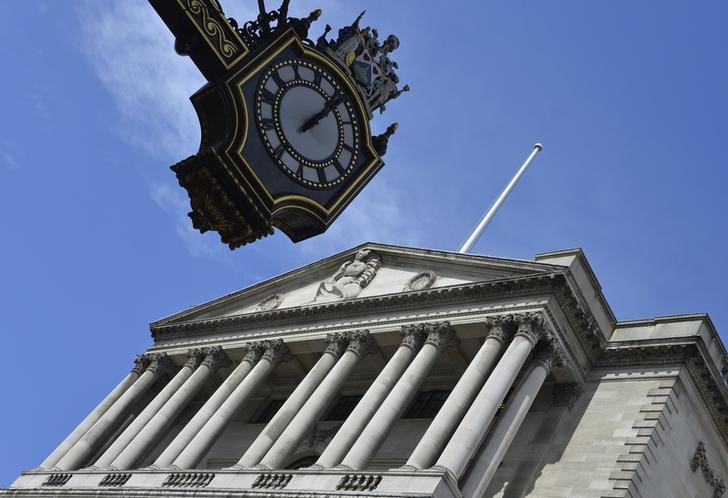By Jonathan Cable
LONDON (Reuters) - The Bank of England is still expected to raise its benchmark interest rate from a record low of 0.5 percent early next year but economists in the latest Reuters poll are now less certain about the timing.
As in all surveys since March, the median in Thursday's poll of 50 economists said the initial hike of 25 basis points would come in the first three months of 2016, followed by similar moves in the third and fourth quarters.
But financial markets are not fully pricing in the first rate hike until the second quarter of next year and over half of the economists polled this week said their conviction about the timing had decreased over the past month.
"Global risks have elevated over the past month which heightens the chance that the first rate hike is delayed," said Nina Skero at CEBR.
Markets around the world plummeted earlier in the week as a slump in Shanghai shares fuelled worries over China's economic health and prompted the People's Bank of China to cut interest rates and lower the amount of reserves banks must hold for the second time in two months on Tuesday.
The United States Federal Reserve was seen as almost certain to begin tightening policy for the first time in a decade next month but analysts now are also starting to waver on that call, suggesting it might be December or later before rates rise in the world's largest economy.
"With the Fed now looking likely to delay its first hike, there is another reason for the BoE to hold back," said Alan Clarke at Scotiabank.
What everyone does seem sure of is that when rates do start to rise they will do so only gradually. At the end of 2017, Bank Rate will still be just 2.0 percent and even by end-2018 it will only have reached 2.5 percent.
Policymakers are facing the dilemma of how to square a strong domestic economy, which points to higher interest rates, with global disinflationary forces, BoE official Kristin Forbes said last week.
Sterling
Only one of the Bank's nine Monetary Policy Committee members voted for a tightening of policy this month, surprising markets which had expected Ian McCafferty to be joined by at least one more of his colleagues.
The latest poll suggested even by the end of the year only three MPC members would be calling for tighter policy, still short of the majority needed for higher rates.

None of the economists polled expect any move when the Bank meets on September 10.
(Polling by Hari Kishan and Sarmista Sen; Editing by Ross Finley/Jeremy Gaunt)